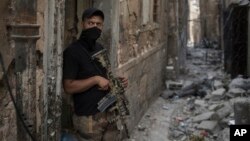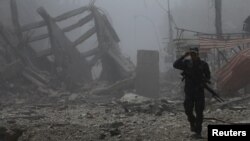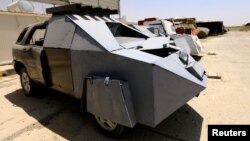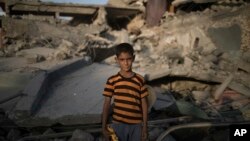Iraq's military may try to eradicate the Islamic State's remaining forces by simultaneously attacking the terror group on multiple fronts in the hopes of taking advantage of infighting and a weakened leadership.
The strategy would be a bold one given the casualties Iraqi forces suffered while trying to retake Mosul.
The U.S. Defense Department estimated IS forces inflicted a 40 percent casualty rate on Iraq's elite Counter Terrorism Service (CTS) in the nine months it took for them to reclaim the city. And the U.S. commander of the global coalition against IS described the fighting in Mosul as the "most extended and brutal combat I have ever witnessed."
Iraqis visit Pentagon
But Iraqi military officials visiting the Pentagon this week, following the declarations of victory over IS in Mosul, appeared undaunted.
"Very soon, we'll start military operations to liberate the remaining Iraqi areas under occupation," Joint Operations Command spokesman Brig. Gen. Yahya Rasool said through a translator.
"We could start military operations toward different areas at the same time," Rasool added. "We're confident that we are capable of having a number of operations simultaneously."
Rasool and the other government officials indicated Iraqi leaders have yet to make a firm decision on exactly how the campaign should play out, though potential targets include Tal Afar, about 60 kilometers to the west of Mosul, and the town of Hawija in Iraq's Kirkuk province.
U.S. officials have said efforts to clear Mosul of pockets of Islamic State fighters could last for weeks.
Iraqi soldiers told VOA that the remaining IS fighters, as well as women and children — all wearing suicide vests — are now launching attacks from basements and tunnels under the city.
Striking at IS
Still, Iraqi and U.S. officials see an opportunity to strike at IS while it is weak and still reeling from the loss.
"They're fighting among themselves in Hawija and Tal Afar, currently," Rasool said Thursday, when asked about what is left of IS leadership following the battle for Mosul.
"We killed a large number of the leadership, and they collapsed within their structure," he said.
U.S. officials estimate there are still a couple of thousand IS fighters spread throughout Iraq. Some analysts suggest the numbers could be even higher, and both officials and experts worry about the presence of so-called sleeper cells in all the territories that have been reclaimed from IS forces.
Aside from strongholds in Tal Afar and Hawija, IS still controls swaths of lands in Iraq's Anbar province, where they continue to enjoy some freedom of movement despite pressure from the coalition's ongoing air campaign.
Iraqi officials say continued coalition air support will be crucial for their continued success, and admit additional help will be needed.
"What we would like from the international or global coalition is the continuous support to Iraqi forces," said Brig. Gen Saad Maan, a spokesman for Baghdad Operations Command and the Iraqi Ministry of the Interior. "This also requires additional training, and providing the basic services, and cameras, and surveillance equipment so that we'll be able to stabilize the area."
Tough fight ahead
As far as how long it will take to subdue what remains of IS, neither Iraqi nor coalition officials have been willing to say.
"It's been a tough fight. There's a lot of tough fighting ahead," U.S. Defense Secretary Jim Mattis said Friday.
"We're there to help them fight and defeat and destroy that physical caliphate and I'm sure we'll continue to bring in air support," Mattis said.
The U.S. and other coalition partners, including Australia, Finland and Britain, have also continued to train Iraqi forces for the battles ahead.
"The Iraqi Security Forces and the coalition have a plan to get after them. And we will move with all due speed to do that," Lt. Gen. Stephen Townsend, Operation Inherent Resolve Commander, told Pentagon reporters on July 11. "We'll be at it until it's done."
For their part, despite a looming referendum on Kurdish independence, peshmerga officials say their forces are ready and willing to support Iraqi military efforts to wipe out IS.
"We can launch a number of operations," said Brig. Gen. Halgwrd Hikman Ali, who was visiting the Pentagon with his Iraqi counterparts.
"We can launch a military operation toward Tal Afar and another one toward Al-Qa'im, and another one toward — maybe another one toward Hawija," he said. "We have enough forces to liberate what is remaining."
VOA Middle East Correspondent Heather Murdock contributed to this story from Mosul.







